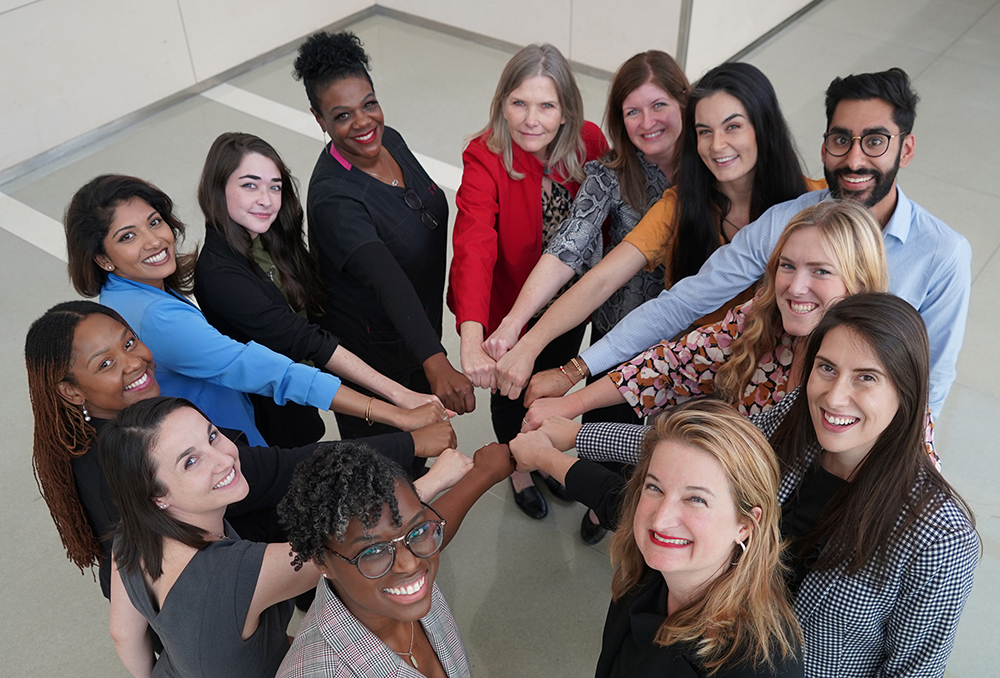The research team representing the Patient Engagement and Research Lab, now based in Houston, Texas, ends the year very grateful to be together.
Thanks to the support and mentorship of Drs. Osama Gaber, Chief of Surgery at Houston Methodist Hospital, and Mark Ghobrial, Medical Director of Transplant Center, Dr. Amy Waterman was recruited to Houston Methodist Hospital and J.C. Walter Jr. Transplant Center to establish a broader Patient Engagement and Research Lab to advocate for patients and what is important to them, in all ways. The mission of the lab is to improve patient communication and education, expand access to optimal treatments, and improve health outcomes. She shared, “As a psychologist, I have been thinking about what patients need and testing the effectiveness of innovations to better support them for my entire career. When I learned that my new title would be Director of Patient Engagement, Diversity, and Education, I knew that the move was a perfect choice to expand the direction of my work more broadly.”
This year, Dr. Waterman was re-appointed Full Professor of Outcomes Research in Surgery at Houston Methodist Hospital (HMH). Her lab has grown to include Dr. LaShara Davis as an independent Scientist and Assistant Professor of Outcomes Research in Surgery, Dr. Andrea Meinders as a Surgical Research Fellow, Catherine Pulicken as the Project Manager, and Victoria Cassell as the Clinical Research Data Coordinator. She’s busy mentoring medical students through the Houston Methodist Hospital Clinical Scholars program, including Divek Toprani, Gregory Wilson, Alexandra Farangui, and Hannah Bass, and three Assistant Professors as part of the National Institutes of Health PRIDE program to increase diversity among individuals engaged in health-related research. “It’s time to build the next generation of diverse researchers and health care providers,” she says.
The team hit the ground running and were immediately successful at receiving multiple federal grants from the Agency for Healthcare Research and Quality (AHRQ), Health Resources and Services Administration (HRSA), the National Institutes of Health (NIH) Artificial Intelligence/Machine Learning Consortium to Advance Health Equity and Researcher Diversity (AIM-AHEAD), and the National Heart, Lunch, and Blood Institute (NHLBI). They also established national partnerships with kidney and transplant organizations including the Mendez National Institute for Transplantation Foundation (MNITF), the National Kidney Foundation (NKF), LifeGift organ procurement organization, the Transplant Recipient’s International Organization, and Sanofi.
Dr. Davis hit an important professional milestone this year, successfully winning her first grants as an independent investigator from both the National Kidney Foundation and the NHLBI. “After years of shadow boxing with imposter syndrome, I was in disbelief that I’d been awarded my first grants. I felt both inspired to continue and humbled that my ideas and work were deemed worthy of funding! It’s been a rollercoaster of emotion, but I’m left with an overwhelming feeling of gratitude and excitement about being able to continue doing work to help patients,” said LaShara Davis.
The team continues to publish research articles on topics related to kidney paired donation, living donation education, digital storytelling media campaigns, and reducing disparities to increase access to transplantation. Recent articles have been published in the American Journal of Transplantation and the Clinical Journal of the American Society of Nephrology. We have presented posters and oral talks at the American Transplant Congress (ATC) in June, and the American Society of Nephrology (ASN) in November. We have also attended many events and conferences including the Transplant Games of America in San Diego, the Society of Behavioral Medicine (SBM) Conference in Baltimore, and the SRTR People Driven Transplant Metrics Consensus Conference in Minnesota to name a few! Catherine shared, “I had the opportunity this year to attend my first Transplant Games, and it was really touching to hear all the amazing stories from real-life patients and donors. It made me feel even more connected to the purpose of our research!”
So, what are we most grateful for at the close of this year?
- For establishing our lab successfully at Houston Methodist Hospital and Research Institute.
- For being in a caring community of researchers and clinicians who stand, shoulder to shoulder together, to help people live long and full lives.
- For the patients and living donors who share with us what is still needed within the healthcare field, so we can improve.
- For the innovative health ecosystem that we work within that is now prioritizing improving the patient experience and ensuring equity in access to transplant at a level never seen before.
- For you, for reading this.
The strength of our community and their dedication to bettering the healthcare space is nothing short of amazing. We wish you a happy and safe new year and look forward to launching our projects in 2023!

